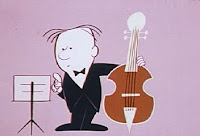More Reasons Why Work-for-Hire Stinks
Another copyright case from the comics world, but one that has implications for people working in animation. Writer Gary Friedrich created Marvel's version of Ghost Rider . He sued Marvel claiming that it was created and offered to them and was not done as work for hire. He lost the suit. Previously, Friedrich commissioned artwork of the character which he sold at various comics conventions. Here's where it gets ugly: "As per the courts instructions Friedrich has to account for any and all money that he has received, “...relating to the gross and net amount derived from Plaintiffs' sale of goods bearing the Ghost Rider image, likeness, or Marvel trademark.” This means that Friedrich has to account for every cent each and every time he sold a print at a convention or any other item to anyone, that has the Ghost Rider image or name on it, and he has to account to all of the defendants in the case, and there’s quite a few of those, including, but not limited to...


